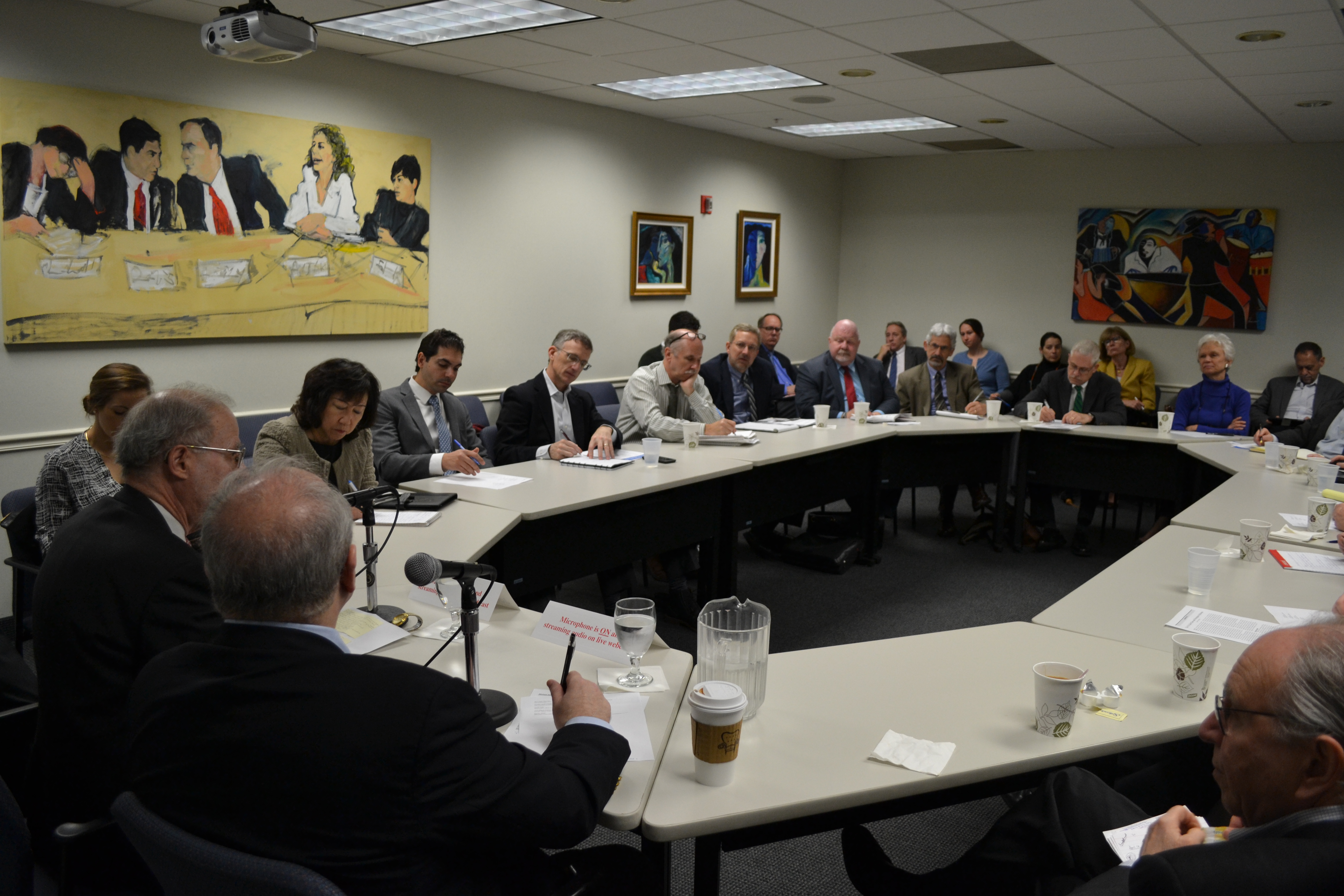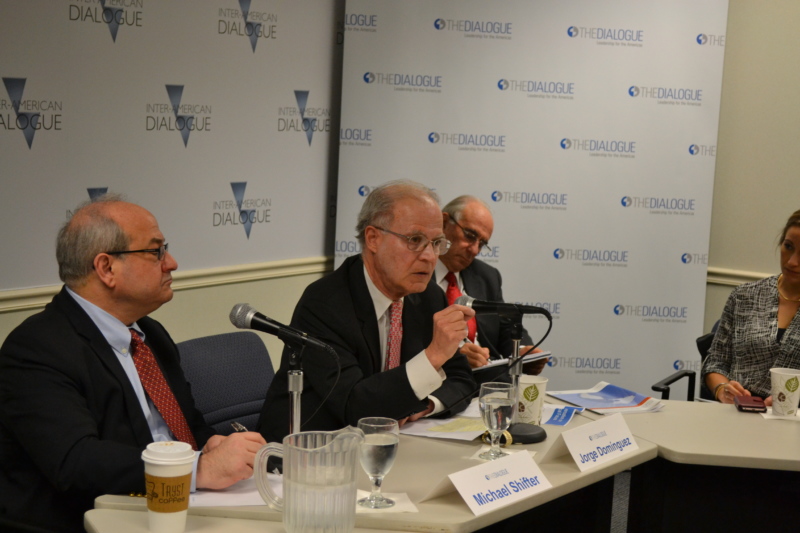Europe Might Take Another Step Back
If Spain fails to have the Common Position lifted or if it succeeds and Havana again turns down European economic cooperation, then Cuba wins once more.
Cuba has been at the forefront of many recent conversations on US foreign policy, particularly after President Obama’s historic decision to restore diplomatic relations and visit the island. Much has been debated about next steps and how the US should go about lifting the embargo. However, less has been said about Cuba’s current and future internal political situation. To provide insight on Cuba’s political future, the Inter-American Dialogue organized a private event featuring Jorge Dominguez, a founding member of the Dialogue and the Antonio Madero Professor for the Study of Mexico at Harvard University, as well as leading analysts and experts.
Michael Shifter, president of the Dialogue, opened and moderated the event. Dominguez then discussed reactions to President Obama’s visit, the upcoming 7th Cuban Communist Party Congress, and the political challenges that lie ahead. He then answered questions from the audience and further discussed the implications of opening up the economy, the role for the Cuban-American community, and possible successors to Raúl Castro after he steps down in 2018.
Prof. Jorge Domínguez discussing the agenda for the 7th Cuban Party Congress pic.twitter.com/G1soYc1vJT
— The Dialogue (@The_Dialogue) April 7, 2016
Dominguez’s initial remarks focused on the official reactions to President Obama’s March visit to Havana and what they likely imply—particularly those of Fidel Castro and René González Barrios, president of the Cuban Institute of History. Castro asserted that the Cuban people would never renounce their glory and that they did not need imperialist handouts. Moreover, González Barrios compared Obama to General Arsenio Martínez de Campos, a commanding Spanish officer who imposed colonial rule in Cuba in the late 19th century. These reactions, Dominguez argued, would have never taken place if Obama’s visit to Cuba had been insignificant.
Regarding the upcoming Communist Party Congress (April 16-18), Dominguez expects the Party to adopt an attitude that honors Cuba’s revolutionary ideals while acknowledging that some changes must be made. However, very little is known about the agenda for the congress—and there has been almost no public discussion on major themes and issues. All that is known is that five of the six points pertain to economic policy.
Since the last Party Congress, the most accurate description of Cuba’s economy would be one of “no growth.” 2015, however, was not a bad year for Cuban economic growth, and Dominguez attributed this to a significant jump in international tourism. Such jump was due in part to the number of American visitors, estimated at 450,000, which makes the US the second biggest tourism market. That statistic, however, was reported in official Cuban reports under “Others”—a sign that the government is reluctant to recognize the growing economic role of US visitors. When asked about the role of Cuban Americans in the Cuban transition, he explained how there is still a big reluctance to issue visas, even to those who support Obama’s policies, and how the issue of remittances will remain a problem if no banking relations are established. On the other hand, Dominguez argued that while Cuba should deal with its private sector in an encouraging way, what they have done is the opposite, deciding to heavily and ineffectively tax self-employed Cubans and other private sector actors.
Dominguez also highlighted the political impact of the relative deterioration in Cuba’s two “crown jewels:” education and health care. He noted that during Raúl Castro’s regime, higher education enrollment has decreased by 71%. Moreover, access to health care has been informally privatized, meaning that if Cubans need urgent care, they must pay in order to get such access—or else have to wait months. From the perspective of the political regime, both of these issues represent serious challenges to legitimacy. Moreover, he indicated that population is shrinking and the revolutionary generation, which represents the core support for the regime, is aging quickly.
[caption id="attachment_48862" align="alignright" width="442"] Photo by Ben Raderstorf / Inter-American Dialogue[/caption]
Photo by Ben Raderstorf / Inter-American Dialogue[/caption]Dominguez also addressed the question of whether Raúl Castro is “a liberal or not,” pointing out that the situation has considerably improved for gay Cubans under Castro, since it is now illegal to discriminate based on sexual orientation. Moreover, it is now actually possible to read criticism of the regime online, there is no death penalty, and the number of political prisoners has dropped considerably, which for Dominguez are all steps in the right direction—albeit at a timid pace.
Castro plans on stepping down in 2018, and Dominguez contended how there is still a problem of succession, both in the political bureau as well as the military leadership. Only four members of the politburo were born before the revolution, and three of them are among the least popular members of the body. Moreover, the country has done a poor job integrating women and black Cubans, and the few who are part of the political leadership are also among the least popular. Lastly, the median age for military officers is 75 years old. When asked about Cuba beyond 2018, Dominguez said he expects the succession to be fairly uneventful, just as it was when Fidel stepped down, although Raúl could remain as First Secretary (and step down as President of the Council of State and the Council of Ministers) to help smooth the transition.
If Spain fails to have the Common Position lifted or if it succeeds and Havana again turns down European economic cooperation, then Cuba wins once more.
The Summit of the Americas was marked by discord between the US and Latin American countries. What did it accomplish, if anything?
On April 25, the Inter-American Dialogue hosted a conversation on the Cuba’s evolving political and economic situation and how the Catholic Church views its role in the country.
 Ben Raderstorf / Inter-American Dialogue
Ben Raderstorf / Inter-American Dialogue